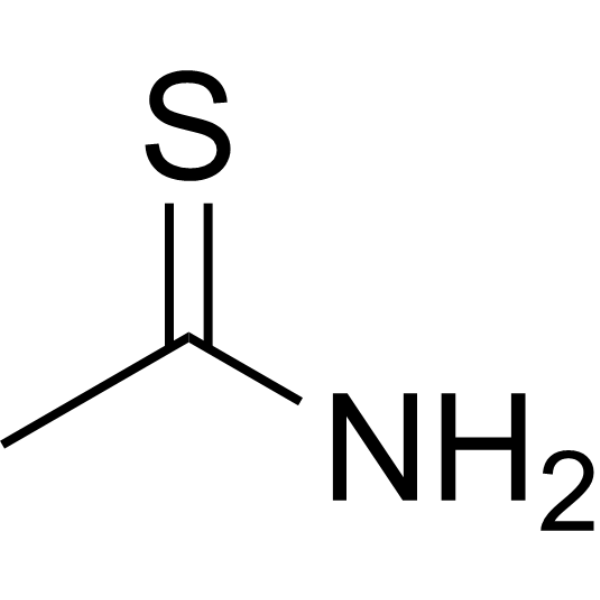
Thioacetamide
CAS No. 62-55-5
Thioacetamide( TAA )
Catalog No. M28034 CAS No. 62-55-5
Thioacetamide is a hepatotoxicant used widely to induce experimental liver lesions, develops hepatocellular necrosis and subsequent inflammation (mainly M1-/M2-macrophages without neutrophil infiltration) in rats.
Purity : >98% (HPLC)
 COA
COA
 Datasheet
Datasheet
 HNMR
HNMR
 HPLC
HPLC
 MSDS
MSDS
 Handing Instructions
Handing Instructions
| Size | Price / USD | Stock | Quantity |
| 500MG | 30 | Get Quote |


|
| 1G | 45 | Get Quote |


|
Biological Information
-
Product NameThioacetamide
-
NoteResearch use only, not for human use.
-
Brief DescriptionThioacetamide is a hepatotoxicant used widely to induce experimental liver lesions, develops hepatocellular necrosis and subsequent inflammation (mainly M1-/M2-macrophages without neutrophil infiltration) in rats.
-
DescriptionThioacetamide is a hepatotoxicant used widely to induce experimental liver lesions, develops hepatocellular necrosis and subsequent inflammation (mainly M1-/M2-macrophages without neutrophil infiltration) in rats.
-
In VitroThioacetamide (TAA; 0-10000 μM; 24 h; WB-F344 cells) has cytotoxicity in a concentration-dependent manner.Thioacetamide (TAA; 1000 and 10000 μM; 0-24 h; WB-F344 cells) has differentially-expressed genes in the early phases at low (1000 μM) and high (10000 μM) concentrations. Cell Viability AssayCell Line:WB-F344 cells Concentration:0-10000 μM Incubation Time:24 hours Result:Had 20% and 50% cell death at the 1000 and 10000 μM concentrations, respectively.
-
In VivoThioacetamide (TAA; 100 mg/kg; i.p.; three times weekly) can induce chronic liver fibrosis in male ICR mice.Thioacetamide (200-1200 mg/kg; i.p.; once) induces hepatic encephalopathy model in C57BL/6 mice. Animal Model:Male ICR mice Dosage:100 mg/kg Administration:Intraperitoneal injection; three times weekly for eight weeks Result:Induced chronic liver fibrosis in male ICR mice and resulted in lower body weight, serum cholesterol and triglycerides as well as increased liver size, ALT, AST and LDH values.Animal Model:Male C57BL/6 mice (20-25g, aged 8-12 weeks)Dosage:200, 600, and 1,200 mg/kg Administration:Intraperitoneal injection; once Result:Altered the neuropsychiatric state, motor behavior and reflex and sensory functions.Increased in the glutamate release in the cerebral cortex of Hepatic encephalopathy (HE) mice.
-
SynonymsTAA
-
PathwayOthers
-
TargetOther Targets
-
RecptorHIV|IL Receptor|MIP|NF-κB|NO|TNF-α
-
Research Area——
-
Indication——
Chemical Information
-
CAS Number62-55-5
-
Formula Weight75.13
-
Molecular FormulaC2H5NS
-
Purity>98% (HPLC)
-
SolubilityIn Vitro:?DMSO : 100 mg/mL (1331.03 mM)
-
SMILESCC(N)=S
-
Chemical Name——
Shipping & Storage Information
-
Storage(-20℃)
-
ShippingWith Ice Pack
-
Stability≥ 2 years
Reference
1.Kotewong R, et al. Structure–function relationships of inhibition of mosquito cytochrome P450 enzymes by flavonoids of Andrographis paniculata. Parasitol Res. 2014 Sep;113(9):3381-92.
molnova catalog



related products
-
Prostaglandin G/H sy...
Prostaglandin G/H synthase 1 inhibitor (CP 74006) is a selective D5D inhibitor with an IC(50) value of 20 nM.
-
(S)-3-(4-Hydroxyphen...
(S)-3-(4-Hydroxyphenyl)-2-hydroxypropionic acid (compound 1) is a metabolite isolated from the culture medium of Leuconostoc mesenteroides.
-
4-Acetoxybenzoic aci...
4-Acetoxybenzoic acid is cleaved by O-acetylesterase which harvests, purifies and acts as the source of Influenza C virus.



 Cart
Cart
 sales@molnova.com
sales@molnova.com


